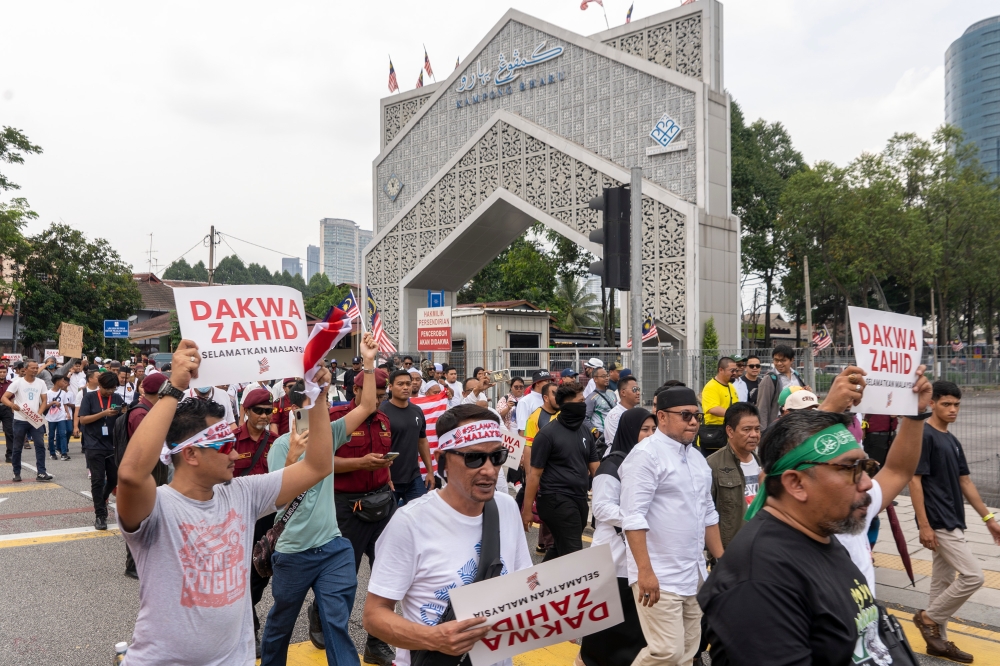SEPTEMBER 17 — Two cases may explain why the police consider the Opposition-backed “Save Malaysia” rally unlawful.
The first is the case of Public Prosecutor v Yuneswaran a/l Ramaraj [2015] which I referred to in “Let’s ‘Segulai Sejalai’ and not commit any offence”.
Organisers must comply with the requirement of Section 9(1) of the Peaceful Assembly Act 2012 (PAA). Failure to obey and comply with the provision is an offence and punishable under Section 9(5) of the PAA.
The second is the case of Shamsul Iskandar @ Yusre bin Mohd Akin lwn Pendakwa Raya [2017]. In this case, the accused was arrested and charged under Section 4(2) of the PAA in relation to his participation in an assembly known as “Blackout 505” which aimed at objecting to the decision of the 2013 Election.
When he was arrested, the accused was attending the assembly at the vicinity of Masjid Ar-Rahman, University Malaya. Under Section 4(1)(b) of the PAA, the right to organise an assembly or participate in an assembly peaceably and without arms does not extend to an assembly held at any prohibited place and within fifty metres from the limit of the prohibited place.
Section 3 PAA defines “prohibited places” to include the places as may be specified in the First Schedule, which in turn includes places of worship. Assembling at a place of worship is therefore prohibited.
The accused applied to the High Court where he sought to raise the question of whether the provisions of Section 4(2)(b) of the PAA (organising or participating in an assembly held at any prohibited place and within fifty metres from the limit of the prohibited place) was inconsistent with the fundamental right of a Malaysian citizen to an assembly under Article 10(2)(b) of the Federal Constitution.
The accused sought an order of the High Court that: (a) Section 4(2)(b) of the PAA was void and illegal; (b) that the charges against him be set aside and quashed; (c) he be acquitted and discharged; and (d) the criminal proceedings against him be stayed pending the disposal of this application.
In response, the Public Prosecutor submitted that what was provided by the First Schedule of the PAA was clear; the prohibition against assembling at a place for worship was within the distance of 50 metres.
High Court Judge Azman Abdullah dismissed the accused’s application and agreed with the submission of the public prosecutor.
At the time and date of the incident, the accused was within the vicinity of Masjid Ar-Rahman, University Malaya with the objective of attending an assembly held at a prohibited place, namely a place of worship. Therefore, the issue of whether it was carried out in peace or whether they were armed was not in dispute and the court held that it was constitutional.
The learned judge added that for the place of worship for the Muslims, the interaction between men and women is limited and clothes that cover the aurat is compulsory and very sensitive. The sacredness of a place of worship must be maintained and this remains so even in 1,000 years.
The provision of Section 4(2)(b) of the PAA aims at safeguarding the rights and freedoms of individuals to assembly but at the same time maintaining the sacredness of a place of worship.
Delivering his judgment in BM, the learned judge said:
“Samada kita menganut agama ‘A’ atau ‘B’ atau ‘C’, kita bangsa ‘A’ atau ‘B’ atau ‘C’ atau kita berfahaman politik ‘A’ atau ‘B’ atau ‘C’ kita mempunyai anutan, fahaman dan amalan berbeza, namun kita perlu sensitif dan perlu menjaga dan melindungi tempat ibadah masing-masing.”
Assembling at a place of worship is prohibited.
Freedoms are not absolute. The lawful exercise of one’s right to assemble peaceably can be restricted on grounds of national security or public order, and balanced with the protection of the rights and freedoms of other persons as well.

* This is the personal opinion of the writer or publication and does not necessarily represent the views of Malay Mail.





















